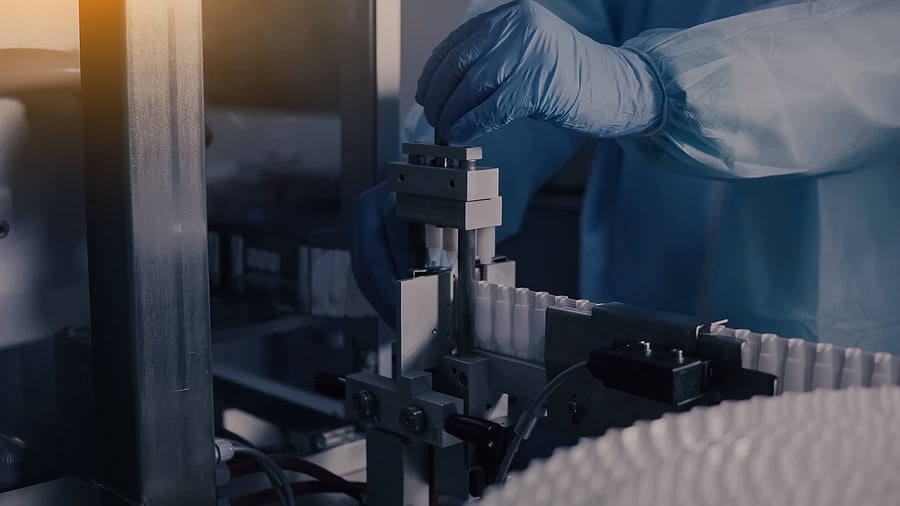
Home to the world’s top biopharma companies, leading universities and medical centers, a robust startup ecosystem, and hundreds of biotech companies, Massachusetts is the best place in the world to launch, grow, and scale transformational life sciences companies. To see the cluster’s global impact firsthand, look no further than its response to COVID-19: more than 95 companies with a presence in Massachusetts – including the two companies with the only approved vaccines in the U.S – are actively working to address the pandemic.
While Massachusetts has all the elements to remain a life sciences powerhouse for years to come, MassBio’s State of Possible 2025 Report points out that it’s not a foregone conclusion. Massachusetts faces fierce competition both at home – from states like Pennsylvania and North Carolina – and abroad from countries like China.
The difference? These geographies have a robust biomanufacturing footprint. To maintain our leadership in the life sciences, Massachusetts must grow beyond R&D to develop leading-edge biomanufacturing capabilities. Expanding Massachusetts’ biomanufacturing footprint will help build new avenues for life sciences growth while ensuring the long-term sustainability and resilience of the ecosystem.
It will take all participants in the ecosystem to make this happen. From government and trade organizations to startups and investors, we all have a role to play in growing this new pipeline of life sciences activity. To start, we need to identify, develop, and prioritize the right building blocks for our new biomanufacturing economy. Here are our ideas:
Continue Supporting Mini-Clusters Outside of Metro Areas to Meet Top Talent Where They Live
More than 16.5 million square feet of commercial lab space has been built in Massachusetts over the last 10 years – and it’s all full. In Boston, only 0.8% of lab space is available, and across the river in East Cambridge – home to Kendall Square – there is a vacancy rate of 0.0%. And, with commercial rental prices in Kendall Square among the highest in the country, MassBio is encouraging companies to look outside the epicenter and towards the mini-clusters developing throughout the state. While Cambridge and Boston notoriously specialize in R&D, the availability and cost of space in the suburbs and beyond provide opportunities for the specialization of new capabilities like biomanufacturing. I often hear that companies are wary to move outside of Boston and Cambridge due to the perception that they won’t be able to find top talent. This is not the case.
MassBio’s 2019 Transportation Survey found that 60% of respondents would change jobs for a better commute. COVID-19 has decentralized work from major cities, and we encourage companies to take advantage of these changes. Building facilities where employees live can provide a better work-life balance, by way of shortened commutes and less traffic or public transportation-related frustration. Additionally, world-class universities outside of Cambridge and Boston, like the UMass System, Worcester Polytechnic Institute, and Amherst College, provide a robust cohort of talent that can be recruited and employed locally.
Expand Pool of Skilled Workers Across the State
As the biomanufacturing sector beings to grow and flourish, so does the demand for diverse skillsets. Importantly, biomanufacturing roles require different skillsets and education experience levels than biotech R&D that can greatly expand the potential talent pool across communities and populations. MassBio’s sister organization, MassBioEd, recently announced the launch of a new apprenticeship program which uses the “apprenticeship model of technical education, on the job paid training, and mentorship to create a new and diverse pool of skilled workers to fill the talent pipeline for Massachusetts’s life sciences industry.” MassBioEd is targeting biomanufacturing technicians as one of the occupations for its apprenticeship program. Educational programs such as these along with the other excellent existing programs at our state’s universities and community colleges will help ensure Massachusetts has the pipeline of skilled workers necessary to attract biomanufacturing facilities here.
Ease Regional Expansion
Developing and maintaining a biomanufacturing facility is an enormous investment for everyone involved – from the company putting down roots to the municipal government the facility operates within. Strong public-private partnerships are key to ensuring that companies can easily identify sites suitable for biomanufacturing. To that end, MassBio developed its BioReady ratings to help biotechnology companies find the best cities and towns that will help support their efforts and growth. For example, Lexington – a Platinum-rated community – offers incentives for companies looking to build or expand, and Hopkinton – a Gold-rated community – has an expansive cohort of talent and is seeking ways to recruit new companies. With partnerships between the industry and municipal governments in place, life sciences companies can feel confident in their investment and the sustained growth of the local ecosystem.
To ensure our progress continues, the state and the industry need to continue investing in biomanufacturing. There is an incredible opportunity for Massachusetts to grow beyond its role as R&D hub into an established ecosystem that supports companies across the lifecycle, but to get there, we need mini-clusters, top talent, and regional incentives for companies. These components, combined with a true partnership between all life sciences-related industries, will ensure that Massachusetts remains the best place in the world for the life sciences.
To learn more about how MassBio can support all your economic development needs, email Ben Bradford or visit the MassBio website.